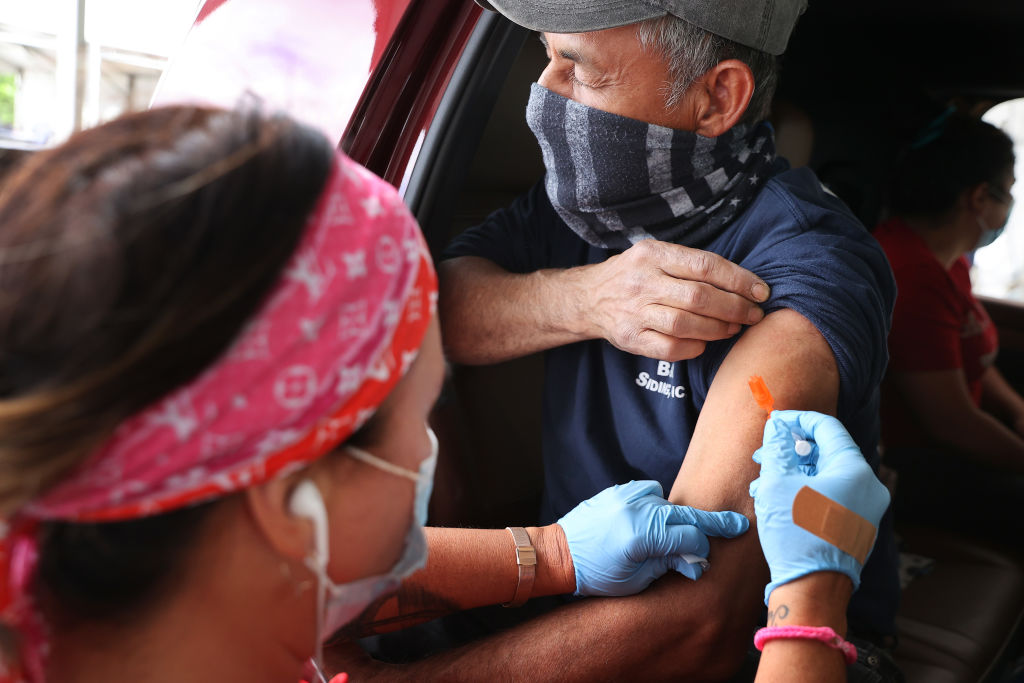More studies show Pfizer and Moderna COVID-19 vaccines protect against worrisome variants


A free daily email with the biggest news stories of the day – and the best features from TheWeek.com
You are now subscribed
Your newsletter sign-up was successful
The Pfizer-BioNTech COVID-19 vaccine is extremely effective against two dangerous variants of the coronavirus, the B.1.1.7 strain first found in the United Kingdom and the B.1.351 variant discovered in South Africa, researchers reported Wednesday in the New England Journal of Medicine and The Lancet.
Moderna also reported Wednesday that, according to early results from its booster shot trial, a third dose of its vaccine given six to eight months after the first two doses boosted antibodies to protect against the South African B.1.351 variant and other worrisome strain found in Brazil. Moderna is testing its original vaccine and a version modified to target the B.1.351 variant.
The new variants are more transmissible than the original strain and, some studies suggest, deadlier. The New England Journal of Medicine study examined records of more than 200,000 people from Qatar's COVID-19 database. The Pfizer vaccine was 87 to 89.5 percent effective at preventing infection from the B.1.1.7 variant among people two weeks past their second shot, 72.1 to 75 percent effective against the B.1.351 variant, and 100 percent effective at preventing severe, critical, or fatal cases of either variant, the researchers found.
The Week
Escape your echo chamber. Get the facts behind the news, plus analysis from multiple perspectives.

Sign up for The Week's Free Newsletters
From our morning news briefing to a weekly Good News Newsletter, get the best of The Week delivered directly to your inbox.
From our morning news briefing to a weekly Good News Newsletter, get the best of The Week delivered directly to your inbox.
The study in The Lancet was based on more than 230,000 cases from Israel. It found that the Pfizer vaccine was more than 95 percent effective against infection, hospitalization, or death in fully vaccinated people 16 and older, and 94 percent effective in people 85 and older. The vaccine efficacy numbers aren't self-evident, but Brains On!, a science podcast for kids, has a short, entertaining, and pretty effective explanation using defecating seagulls. You can watch that below. Peter Weber

A free daily email with the biggest news stories of the day – and the best features from TheWeek.com
Peter has worked as a news and culture writer and editor at The Week since the site's launch in 2008. He covers politics, world affairs, religion and cultural currents. His journalism career began as a copy editor at a financial newswire and has included editorial positions at The New York Times Magazine, Facts on File, and Oregon State University.
-
 The Week Unwrapped: Do the Freemasons have too much sway in the police force?
The Week Unwrapped: Do the Freemasons have too much sway in the police force?Podcast Plus, what does the growing popularity of prediction markets mean for the future? And why are UK film and TV workers struggling?
-
 Properties of the week: pretty thatched cottages
Properties of the week: pretty thatched cottagesThe Week Recommends Featuring homes in West Sussex, Dorset and Suffolk
-
 The week’s best photos
The week’s best photosIn Pictures An explosive meal, a carnival of joy, and more
-
 Trump HHS slashes advised child vaccinations
Trump HHS slashes advised child vaccinationsSpeed Read In a widely condemned move, the CDC will now recommend that children get vaccinated against 11 communicable diseases, not 17
-
 FDA OKs generic abortion pill, riling the right
FDA OKs generic abortion pill, riling the rightSpeed Read The drug in question is a generic version of mifepristone, used to carry out two-thirds of US abortions
-
 RFK Jr. vaccine panel advises restricting MMRV shot
RFK Jr. vaccine panel advises restricting MMRV shotSpeed Read The committee voted to restrict access to a childhood vaccine against chickenpox
-
 Texas declares end to measles outbreak
Texas declares end to measles outbreakSpeed Read The vaccine-preventable disease is still spreading in neighboring states, Mexico and Canada
-
 RFK Jr. shuts down mRNA vaccine funding at agency
RFK Jr. shuts down mRNA vaccine funding at agencySpeed Read The decision canceled or modified 22 projects, primarily for work on vaccines and therapeutics for respiratory viruses
-
 Measles cases surge to 33-year high
Measles cases surge to 33-year highSpeed Read The infection was declared eliminated from the US in 2000 but has seen a resurgence amid vaccine hesitancy
-
 Kennedy's vaccine panel signals skepticism, change
Kennedy's vaccine panel signals skepticism, changeSpeed Read RFK Jr.'s new vaccine advisory board intends to make changes to the decades-old US immunization system
-
 Kennedy ousts entire CDC vaccine advisory panel
Kennedy ousts entire CDC vaccine advisory panelspeed read Health Secretary RFK Jr. is a longtime anti-vaccine activist who has criticized the panel of experts
